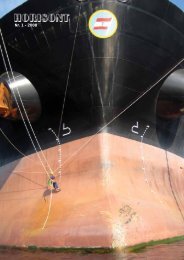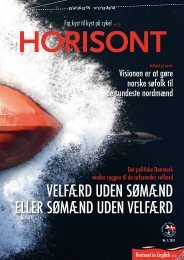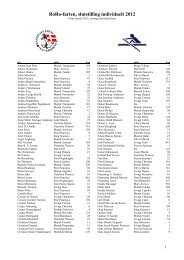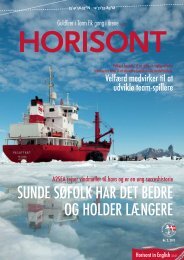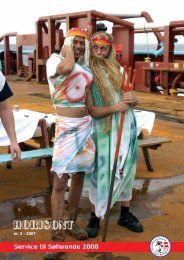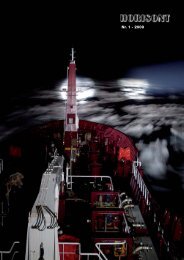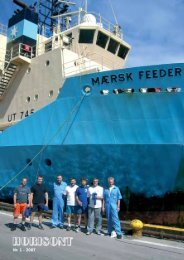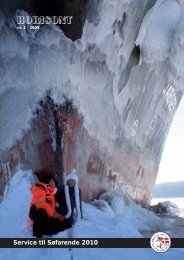Nr. 1 2010 - Handelsflådens Velfærdsråd
Nr. 1 2010 - Handelsflådens Velfærdsråd
Nr. 1 2010 - Handelsflådens Velfærdsråd
You also want an ePaper? Increase the reach of your titles
YUMPU automatically turns print PDFs into web optimized ePapers that Google loves.
the convention will improve the competitiveness of danish shipping and danish seafarers, because the ”cheaper are<br />
becoming more expensive”, says secretary Michael Wengel-nielsen, one of the danes behind the convention<br />
The MLC – Maritime Labour Convention<br />
2006, is a major social step<br />
forward for global shipping, but<br />
Danish shipping will not see any major or<br />
direct impacts from the convention<br />
immediately. But in the future, the convention<br />
will make the ”cheap seafarers<br />
and shipping companies more expensive”,<br />
and will thus strengthen the competitiveness<br />
of Danish ship owners and seafarers.<br />
And why will they become more<br />
expensive?<br />
”Because the MLC convention will<br />
raise the social level of all seafarers<br />
from nations that ratify the convention,<br />
and the majority, presumably all, of<br />
038° HOriSOnt<br />
tHe Mlc cOnVentiOn:<br />
a Great SOcial Step FOrward<br />
FOr GlObal SHippinG<br />
Mlc, 2006<br />
by Peter Larsen, HFV<br />
the nations will do so over the next few<br />
years”, assesses head of the secretariat<br />
Michael Wengel-Nielsen at the Ship<br />
Owners’ Association for smaller ships.<br />
And what does Michael Wengel-<br />
Nielsen know?<br />
Quite a lot in fact. He is perhaps among<br />
those in Denmark who know most about<br />
the convention, the ideas behind it, the<br />
negotiations and the final result. As the<br />
Danish Shipowners’ Association’s representative<br />
at the ILO - International Labour<br />
Organisation - he has been involved in the<br />
preparations for the convention since 2001,<br />
when the first ideas about creating shared<br />
global standards for seafarers were aired.<br />
Maritime Labour Convention, 2006, is a compilation of 42 existing conventions<br />
and 29 recommendations. there is nothing new in the convention in<br />
relation to conventions and recommendations, but eight of these conventions<br />
have never come into force. there are big differences in how many conventions<br />
individual countries have ratified. of the 42 conventions, Denmark has<br />
only ratified 15.<br />
With MLC 2006, one convention has been created that can be incorporated<br />
into national laws and thus create a common basis for the social conditions in<br />
international shipping.<br />
the convention is divided into five main sections which deal with:<br />
• recruitment terms.<br />
• terms of employment.<br />
• Accomodation, housing, nutrition and welfare.<br />
• Work safety, health and social protection.<br />
• Compliance with and implementation and enforcement of the convention.<br />
”MLC is the fourth maritime cornerstone.<br />
We have SOLAS which regulates<br />
maritime safety, MARPOL on the environment,<br />
STCW on maritime education and<br />
skills; and now the MLC, which explains<br />
how we should treat seafarers during<br />
their employment and during their time<br />
on board”, he explains.<br />
miNimum regulatioNs<br />
”The convention sets out minimum<br />
standards for rest periods, the length of<br />
periods on-board, the right to freedom of<br />
repatriation, medical care, welfare and<br />
safety, and to be paid wages at least<br />
once a month. In addition, seafarers<br />
must be covered by a range of social<br />
arrangements, which may include work<br />
injury insurance, nursing, sick pay,<br />
unemployment insurance, maternity/<br />
paternity leave, retirement etc. All<br />
schemes which we take for granted, but<br />
may be innovations in many countries<br />
outside the EU”.<br />
”This means that states which ratify<br />
the convention have an obligation to<br />
ensure that rules are observed on each<br />
ship, before the local marine authorities<br />
can issue an MLC certificate to the ship.<br />
And after receiving the certificate, each<br />
operator must comply with the convention.<br />
The certificate must be renewed every<br />
5 years, with an interim inspection after<br />
2.5 years”, explains Michael Wengel-<br />
Nielsen.<br />
It should be stressed that the convention<br />
does not interfere in salary levels or the<br />
length of leave periods above statutory<br />
holidays. This must be negotiated by the<br />
organisations representing seafarers, but



